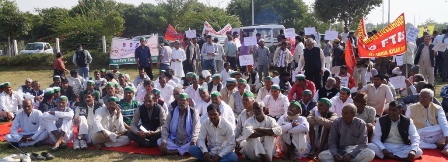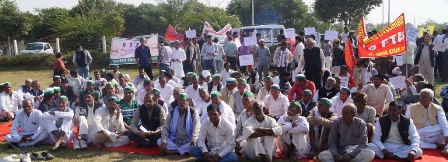 Outlook India
Outlook India
(New Delhi, India, November 29, 2014) Concerned over alleged lack of transparency of the Free Trade Agreement (FTA), farmers’ organisations and trade unions today demanded an immediate halt to negotiations for Regional Comprehensive Economic Partnership (RCEP) proposed to take place in December.
The organisations and unions have shot off a letter to Commerce Minister Nirmala Sitharaman asking the government to stop the negotiations and charged RCEP will jeopardize government’s efforts to revive the manufacturing sector, deeply affect agriculture and production of and access to affordable medicines.
RCEP is an FTA involving 16 countries including 10 of Association of South East Asian Nations (ASEAN) and its free trading partners including Australia, China, India, Japan, South Korea and New Zealand.
“Trade unions and civil society organizations expressed serious concern over the very idea of free trade agreement (FTA), lack of transparency and the absence of socio-economic impact assessments to asses the impact of the proposed FTA,” a statement issued by Indian Coordination Committee of Farmers’ Movement (ICCFM) said.
The 6th Round of Regional Comprehensive Economic Partnership (RCEP) negotiations are scheduled to take place from December 1-5, 2014 in Greater Noida.
“Deeper liberalization beyond existing FTAs through RCEP will jeopardize the government’s efforts to revive manufacturing sector, deeply affect agriculture and production of and access to affordable medicines,” the statement said.
The letter highlighted that seven of the key RCEP members including Australia, Brunei Darussalam, Japan, Malaysia, New Zealand, Singapore, and Vietnam are currently negotiating the Trans Pacific Partnership Agreement (TPP) with countries like United States and Canada.
“We call upon the government to immediately halt India’s engagement in all FTAs including RCEP negotiations and make public the review of India’s existing FTAs and their benefits to the development of Indian economy and its people,” the letter stated.
“Farmers’ movements in India oppose RCEP as it has the potential to irreparably damage Indian dairy and agriculture sector in total,” said Yudhvir Singh, Convenor (ICCFM) while asking India not to go ahead with RCEP negotiations.
The organisations and trade unions also demanded making public all RCEP documents and negotiating texts immediately, conducting a socio-economic and human rights impact assessment of the proposed RCEP agreement and holding public consultations with those who will be directly affected by RCEP including farmers’ organizations, trade unions and others.
Noting that it was evident from Australia and New Zealand FTAs with China that they want more market access for their dairy products, Singh said deeper tariff cuts on agriculture products will intensify agriculture crisis in India.
Noting that many RCEP countries have advanced their manufacturing capability, Amitava Guha of Centre of Indian Trade Unions (CITU) said elimination of import duties on industrial products would intensify the cut-throat competition to reduce the cost of production.
“It will lead to poor quality of employment and downward pressure on wages in the region. This would harm workers’ welfare and put them against each other while seriously impairing workers’ efforts to achieve ‘decent work’ and their right to organise and bargain collectively.

